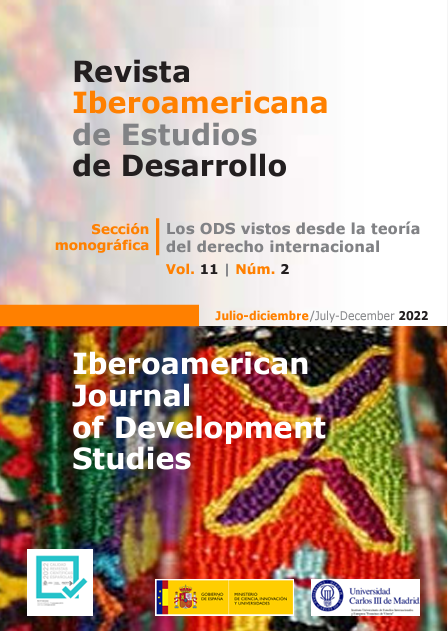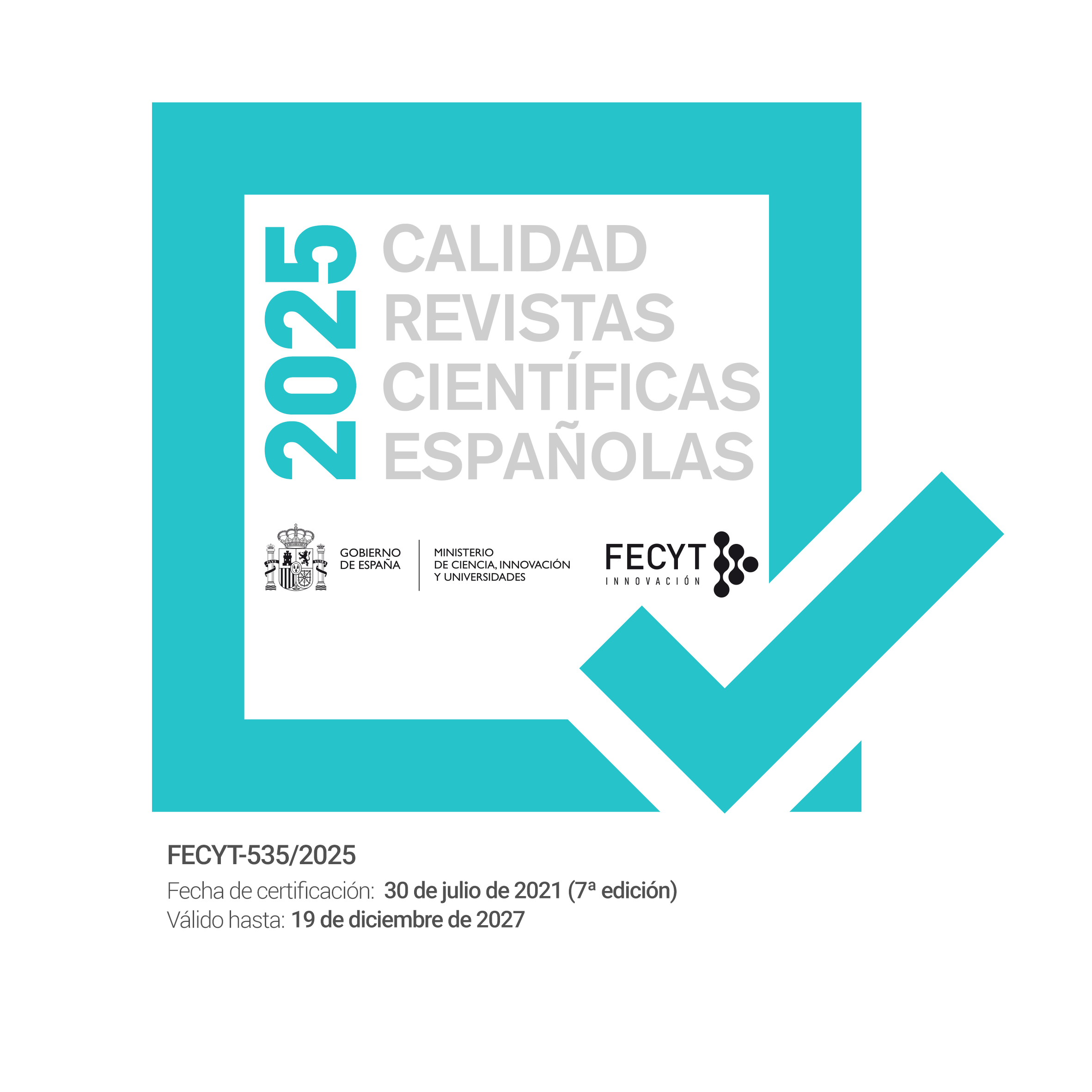Decisions taken by States with authoritarian governments: economic basis and perspectives on SDG 16
DOI:
https://doi.org/10.26754/ojs_ried/ijds.687Palabras clave:
derechos humanos, Estado de derecho, ODS 16, principios económicos, Unión EuropeaResumen
En este artículo se analiza, inicialmente, la posibilidad teórica de que las expresiones «Estado de derecho» y «derechos humanos», contempladas en el Tratado de la Unión Europea, puedan ser analizadas bajo la perspectiva del análisis económico del derecho. A continuación, se centra en los principios económicos que subyacen a la toma de decisiones para apreciar, bajo esa perspectiva, las elecciones realizadas por los Estados, tanto a nivel nacional como internacional (lo que podría incluir también el compromiso con relación a los ODS). A partir de ahí, el estudio se orienta más hacia el ODS 16, proponiendo este investigador, sumariamente, denominar con los términos «horizontal» y «vertical» dos diferentes percepciones básicas sobre sus tres áreas principales (paz, justicia e instituciones fuertes) y descorriendo, de forma tentativa, sobre sus posibles impactos en el ámbito del Estado de derecho y de los derechos y libertades de grupos específicos (v. g., comunidad LGBTQIA+, inmigrantes, refugiados, etc.). Se sugiere que, mientras que, en la «percepción horizontal», se presenta un rol socialmente inclusivo, la «percepción vertical» tiende a ser más excluyente. Buscando su congruencia con lo anterior, se sugiere también que una percepción sesgada del ODS 16 (asociada a la visión «vertical») podría coadyuvar a los Estados autoritarios en la exaltación de su nacionalismo, sin olvidar que el orden público internacional, muchas veces esgrimido como expresión de la soberanía nacional, puede cumplir la función de «escudo defensivo», frente a supuestas «tentativas de alteración» de los valores fundamentales del Estado y de las raíces cristianas de sus sociedades. Simultáneamente, la observación de la cotidianidad política parece sugerir que el orden público puede alterarse al gusto de los partidos políticos populistas. El resultado parece revelar una creciente dicotomía entre valores (europeos vs. nacionales), órdenes públicos (europeo, aunque incipiente vs. internacional y doméstico) y tipos de democracia (liberal vs. antiliberal). Como ejemplos incidentales e ilustrativos, se incluye en el estudio las derivas autoritarias de Hungría y Polonia.
Descargas
Referencias
ALVARES GARCIA JÚNIOR A (2021). Sustainable Development Goals, Rule of Law and Public Policy: Implications for the Traditional Family Model. Cuadernos de Derecho Transnacional 13(2):934-955.
AYTAÇ E, ALI Ç, EZGI E (2021). Partisanship, elite messages, and support for populism in power. European Political Science Review 13(1):23-39.
BAIN PG, KROONENBERG P, LARS-OLOF J, MILFONT TL, CRIMSTON CR, KURZ T, BUSHINA E (2019). Public views of the sustainable development goals across countries. Nature sustainability 2(9):819-825.
BARR N (2020). Economics of the Welfare State. Oxford University Press, Oxford.
BIRÓ P, GUDMUNDSSON J (2021). Complexity of finding Pareto-efficient allocations of highest welfare. European Journal of Operational Research 291(2):614-628.
BLAIR R (2021). UN Peacekeeping and the Rule of Law. American Political Science Review 115(1):51-68.
BLAUBERGER M, VAN HÜLLEN V (2021). Conditionality of EU funds: an instrument to enforce EU core values? Journal of European Integration 43(1):1-16.
BUSYGINA IM, FILIPPOV MG (2020). Changing Incentives and Strategies of National Governments in Multilevel Governance across the European Union. Polis. Political Studies 5(5):148-163.
DAGAN H, KREITNER R (2021). Economic Analysis in Law. Yale Journal. on Regulation 38:566-578.
DALAMPIRA ES, NASTIS SA (2020). Mapping the sustainable development goals: A network analysis framework. Sustainable Development 28(1):46-55.
DE JONG E, MARJANNEKE JV (2021). From the Millennium Development Goals to the Sustainable Development Goals: Evolving discourses and their reflection in policy coherence for development. Earth System Governance 7:107-123.
DEL VECCHIO AM (2021). Orientamenti e tendenze in tema di soluzione delle controversie internazionali (alla luce dei principi di tutela dei diritti umani fondamentali). Studi Urbinati, A-Scienze giuridiche, politiche ed economiche 53(1):39-84.
DEMCZUK AE (2021). The strategy of discriminatory legalism and hate speech cases in Poland. The role of the Commissioner for Human Rights in the fight against discrimination. Annales Universitatis Mariae Curie-Skłodowska, sectio K-Politologia 27(2):127-148.
DJAJIĆ S, STANIVUKOVIĆ M (2021). Changed perspectives and conflicting treaty obligations. Central European Journal of Comparative Law 2(1):53-82.
FONSECA LM, DOMINGUES JP, DIMA AM (2020). Mapping the relationships of the sustainable development goals. Sustainability 12(8):3359-3379.
GWARTNEY JD, STROUP RL, SOBEL RS, MACPHERSON DA (2021). Economics: private & public choice. Cengage Learning, Boston.
HAMID L, WOUTERS J (2021). Rule of law and areas of limited statehood: introduction and perspective. In: Hamid L, Wouters J (eds.). Rule of Law and Areas of Limited Statehood. Domestic and International Dimensions. Edward Elgar Publishing, Massachusetts, pp. 2-22.
INOTAI A (2021). Hungary: Euroscepticism and nationalism. In: Kaeding M, Pollak J, Schmidt P (eds.). Euroscepticism and the Future of Europe, Palgrave Macmillan, Cham, pp. 59-64.
JOPPKE C (2021). Neoliberal Nationalism: Immigration and the Rise of the Populist Right. Cambridge University Press, Cambridge.
KIM RE (2016). The nexus between international law and sustainable development goals. Review of European, Comparative & International Environmental Law 25(1):15-26.
KREKÓ P (2021). Populism in power: the tribal challenge. In: Forgas JP, Crano WD, Fiedler K (eds.). The Psychology of Populism. The Tribal Challenge to Liberal Democracy. Routledge, Abingdon, pp. 240-257.
KURBAN D (2021). Rethinking effectiveness: authoritarianism, State violence and the limits of the European Court of Human Rights. In: Philipp Aust H, Demir-Gürsel E (eds.). The European Court of Human Rights. Current Challenges in Historical Perspective. Edward Elgar Publishing, Massachusetts, pp. 200-220.
LUCARELLI S (2021). The EU migration system and global justice: An introduction. In: The EU Migration System of Governance, pp. 1-32. Palgrave Macmillan, Cham.
MANKIW NG (2020). Essentials of economics. Cengage Learning, Boston.
MARKOVITS D (2021). Transactions Benefits. Yale Journal on Regulation 38:633-675.
MEDEMA SG (2021). Non-welfarism in early debates on the Coase theorem. In: Backhouse RE, Baujard A, Nishizawa T (eds.). Welfare Theory, Public Action, and Ethical Values: Revisiting the History of Welfare Economics. Cambridge University Press, Cambridge, pp. 208-231.
MORIESON N (2021). Religion and the Radical Populist Right: Secular Christianism and Populism in Western Europe. Vernon Press, Delaware.
MOUZOURAKIS M (2021). More law, less law: The European Union’s New Pact on Migration and Asylum and the fragmentation of «asylum seeker» status. European Law Journal 27(1):1-10.
NOVITZ TA, PIERACCINI M (2020). The 2030 Agenda and the Sustainable Development Goals: «Accountable, inclusive, participatory and representative decision-making». In: Novitz TA, Pieraccini M (eds.). Legal Perspectives on Sustainability. University of Bristol Press, Bristol, pp. 39-66.
NOWAK-FAR A (2021). The rule of law framework in the European Union: Its rationale, origins, role and international ramifications. In: Bogdandy AV, Bogdanowicz P, Canor I, Grabenwarter C, Taborowski M, Schmidt M (eds.). Defending Checks and Balances in EU Member States. Taking Stock of Europe’s Actions. Springer, Berlin, Heidelberg, pp. 305-331.
PALAVER W (2021). Collective identity and Christianity: Europe between nationalism and an open patriotism. Religions 12(5):339-384.
PIATKOWSKI M (2021). How the European Union made Poland European again. In: Landesmann M, Szekely IP (eds.). Does EU accession facilitate convergence? The Experience of the EU’s Eastern Enlargement, vol. I: Overall Trends and Country Experiences. Palgrave Macmillan, London, pp. 151-172.
PROGIN-THEUERKAUF S (2021). Defining the boundaries of the future common European asylum system with the help of Hungary? European Papers-A Journal on Law and Integration 6(1):7-15.
SAMUELSON WF, STEPHEN GM, ZAGORSKY JL (2021). Managerial Economics. John Wiley & Sons, New Jersey.
SCHWARTZ A, SEPE SM (2021). Economic Challenges for the Law of Contract. Yale Journal on Regulation 38:678-693.
SPILLER SA (2011). Opportunity cost consideration. Journal of Consumer Research 38(4):595-610.
TOSHKOV D, KORTENSKA E (2015). Does immigration undermine public support for integration in the European Union? Journal of Common Market Studies 53(4):910-925.
VAN ELSUWEGE P, GREMMELPREZ F (2020). Protecting the rule of law in the EU legal order: a constitutional role for the Court of Justice. European Constitutional Law Review 16(1):8-32.
WEYLAND K (2021). Populism as political strategy: An Approach’s Enduring-and Increasing-Advantages. Political Studies 69(21):185-189.
ZENG L (2021). Contemporary International Law and China’s Peaceful Development. Springer, Singapore.
ZOLL F, WORTHAM L (2021). Arming judicial discipline: Poland. In: Devlin R, Wildeman S (eds.). Disciplining Judges. Contemporary Challenges and Controversies. Edward Elgar Publishing, Massachusetts, pp. 278-307.
Descargas
Publicado
Número
Sección
Licencia
Derechos de autor 2022 Armando Alvares-Garcia Júnior

Esta obra está bajo una licencia internacional Creative Commons Atribución-NoComercial-SinDerivadas 4.0.



